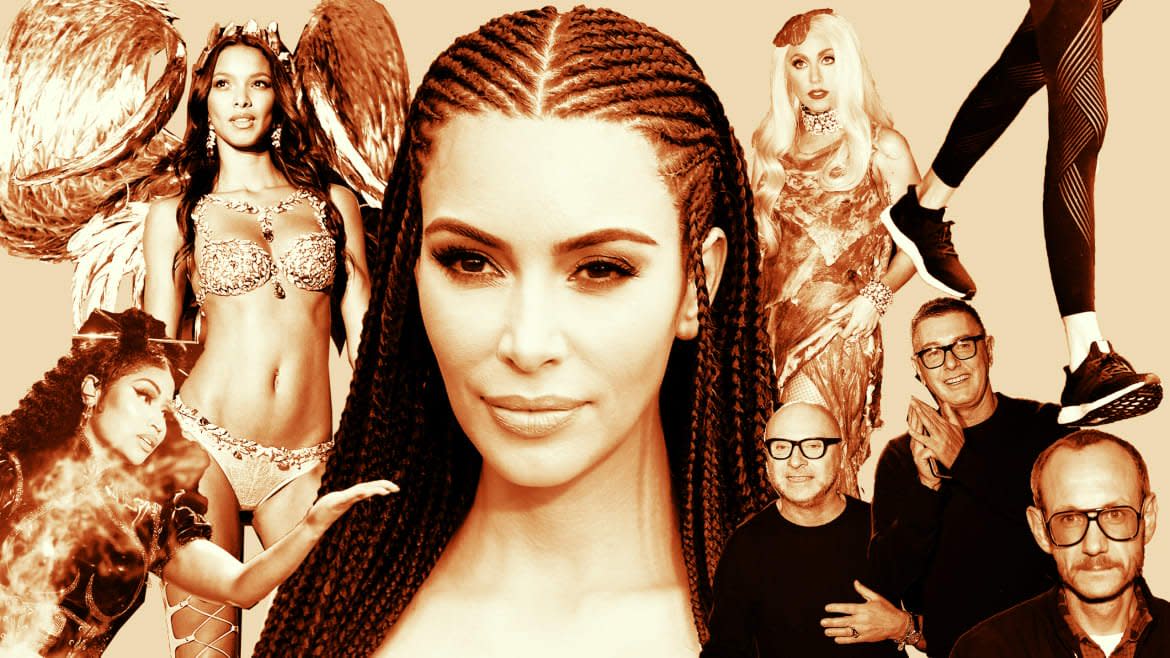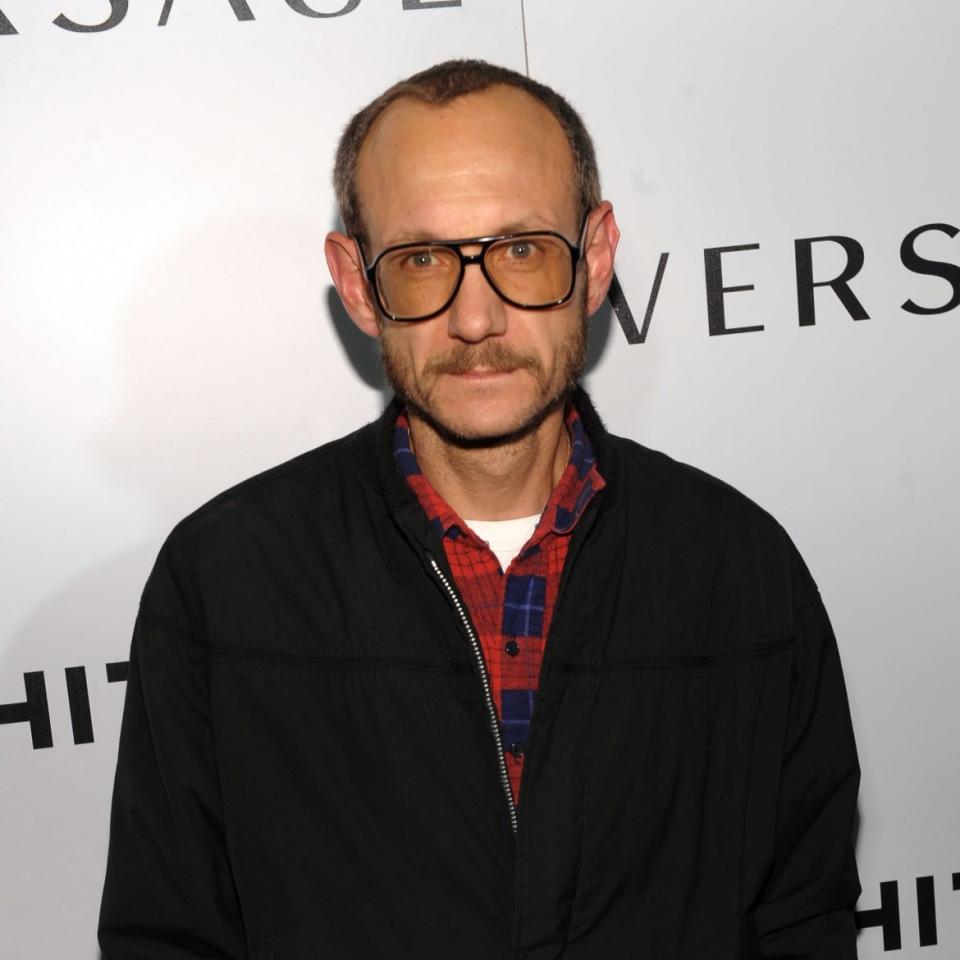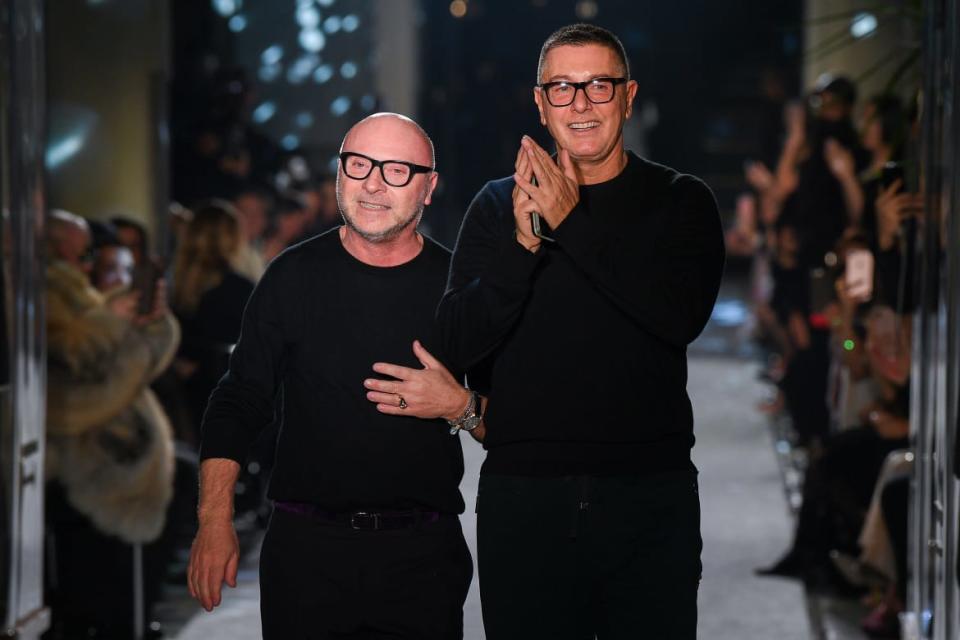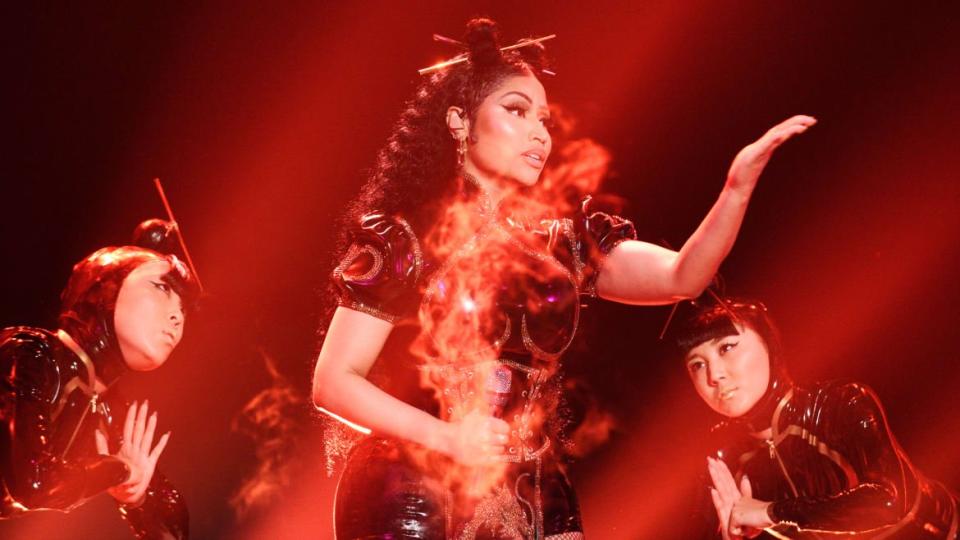Leggings, Creeps, and Cultural Appropriation: The Biggest Fashion Scandals of the Decade

We entered this decade in Snooki poufs and gladiator sandals. Trends reigned above personal preference or taste, a fact made evident by the fact that everyone wore low rise jeans despite the fact that no one looks good in them.
Things loosened up in the 2010s. Blame it on the Lady Gaga, Instagram, or Trump, but over the course of the last 10 years, tastemakers have encouraged women to dress exactly how they want, thank you very much.
Lady Gaga Conquers the Met Gala’s ‘Camp’ Red Carpet
Much has changed, but one thing hasn’t: The people who make, model, or sell our clothes continue to screw up, as dramatically as possible.
The best-laid plans of marketing majors often go awry, leaving the rest of us to wonder who could have possibly OK’d that racist advertisement or sexist T-shirt. The men who capitalize on the female form get outed as abusers. And simple black leggings will continue to make people very, very angry. Such is the decade.
The Red Carpet Goes Wild
Where were you when Lady Gaga wore her infamous meat dress to the 2010 MTV VMAs? Designed by Franc Fernandez, the get-up was criticized by PETA and remains one of the very few outfits to have its own Wikipedia page. (In this writer’s humble opinion, we talk more about about the frock and not enough about its accompanying flank steak fascinator.)
The outfit, which Gaga has said was both a protest against Don’t Ask Don’t Tell and a reminder to the world that she was not “a piece of meat,” got rightfully lampooned after its debut.
But the decidedly un-pretty style ushered in a wave of looks that livened up the red carpet, which until very recently was just a forced march of princess gowns and snoozy tuxedos. The meat dress suggested that celebrity fashion could be an art form.
An argument could be made that without the Meat Dress, there would be no Rihanna in her very meme-able yellow Guo Pei cape, or no Madonna in assless Givenchy at the Met Gala. And who wants to live in a world without those?
The Long Fall of Bad Men
By 2010, we knew full well that Dov Charney, who founded American Apparel in 1989, was a total predator. He’d already masturbated in front of a reporter, admitted to sleeping with employees, and encouraged store managers to fire unattractive staff.
This decade, he was sued for discrimination, accused of sexual assault, battery, and using homophobic slurs. But it took until 2014 for the company to revoke his title as chairman.

Likewise, Terry Richardson flaunted his “creepy” reputation as a photographer for years, allegedly pressuring models to get nude on set, publishing naked photos without their consent, and coercing some to have sex with him—often on camera.
“Uncle Terry,” as he sometimes asked to be called, was beloved by enablers like Miley Cyrus, Lady Gaga, Beyoncé, and Kim Kardashian. Only after #MeToo swelled into a cultural juggernaut did Condé Nast, Valentino, and Bulgari drop the photographer in 2017. Last year, the NYPD opened an investigation into his misdeeds, years after many women first made their allegations.
John Galliano’s Career Rises from the Dead
The decade of cancel culture did little to dull the legacy of John Galliano, a French designer beloved by many insiders for his long career at Givenchy, Dior, and his eponymous label. But in 2011, a viral video found the creative director spewing anti-Semitic remarks and declaring his “love” for Hitler in a Paris bar.
Though Dior axed Galliano and he was fined by the French government for his remarks, the designer staged an Anna Wintour-approved comeback in 2013. Since 2015, he has reclaimed his insider status as creative director for Maison Margiela.
The Decade in Dolce
Domenico Dolce and Stefano Gabbana have seemingly never met a controversy they didn’t like. The Italian design duo delight in their status as provocateurs, whether it be through their overtly sexy advertising or derogatory comments about female celebrities’ looks.
But in 2015, many accused the men—who are both gay—of going too far, due to their comments about same-sex couples adopting children. “We oppose gay adoptions. The only family is the traditional one,” they told the Italian magazine Panorama, also calling babies born from IVF “synthetic.” Backlash ensued, some from the likes of Elton John and Ricky Martin, and #BoycottDolceandGabbana began trending. It would not be the first time.

Three years later, the founders would be accused of anti-Chinese sentiment due to an ad campaign seen as racist, which showed an Asian model eating spaghetti with chopsticks. Then, industry watchdog Instagram account DietPrada posted screenshots which appeared to show texts from Gabbana equating Chinese culture to the poop emoji and suggesting that Chinese people “eat dogs.”
Though the designers would later post an apology video, the damage was done; social media posts showed customers burning their products.
Kanye West Plays Fashion Designer
Yes, this was the Kardashian decade (see cultural appropriation, below), but Kanye West, a family member by extension, also made his mark—and his money. The rapper became a clothing designer through launching Yeezy, first as an Adidas sneaker collaboration in 2013, then as ready-to-wear two years later.
His “seasons,” all staged in extravagant Fashion Week installations (minus the one on Roosevelt Island that gave attendees heatstroke), followed the same beige-and-brown color scheme, and West has a talent for drawing in thousands of dollars for simple sweaters and bland boots.
Since rediscovering religion this year, West set his sights on hawking $235 “Holy Spirit” hoodies and $50 “Church socks.” Whether through divine intervention or smart branding, the clothing sells.
Cultural Appropriation
Kim Kardashian in cornrows. Katy Perry as a geisha. Nicki Minaj performing on SNL with chopsticks in her hair. Perhaps no two words dominated fashion talk in recent years as “cultural appropriation” have—an accusation leveled at celebrities or brands for capitalizing off dressing, acting like, or designing clothes that echo the clothing of various marginalized peoples.
Accused perpetrators in the last decade have included everyone from Miley Cyrus to Bruno Mars. Over the years, more people felt emboldened to say something when they saw a performance or cover spread that didn’t sit right with them.

Still, some mainstream tastemakers were slow to address the sensitivity, such as Marc Jacobs, who said he “didn’t see color” when he sent white models down the runway in dreadlocks, or Vogue magazine editors, who were accused of putting Kendall Jenner in an Afro as recently as last year.
The revolving cycle of these kinds of stories is familiar by now: A brand or star poses in perhaps-offensive garb, people get angry, an apology is issued, and we move on—until the next Twitter moment.
The Slow Death of Victoria’s Secret
In 2009, the reign of Victoria’s Secret seemed long and endless. But by now, the underwear brand has become plagued with scandal. For years, its runway show full of supermodel “Angels” were dubbed sexist, with its models supposedly promoting unrealistic beauty standards.
The empire began to truly crumble last year, when CEO Ed Razek told Vogue he didn’t think that plus-sized or trans models fit the company’s idea of “fantasy,” and he would not have hired them for the annual show. To make matters worse, the brand got caught up in the Jeffrey Epstein scandal when it was revealed L Brand CEO Les Wexner was a close friend and client of the late businessman and sexual predator.
Razek later stepped down from his post, and VS hired a trans model named Valentina Sampaio, who told The Daily Beast “This is just the beginning.”
Except it wasn’t. The brand opted out of hosting a show for 2019, and sales have reportedly fallen from $8 billion to $7.4 billion in one year.
Fashion Fails at Feminism
Post-#MeToo, post-Women’s March, it makes sense that the fashion industry would want a piece of the populist pie that is modern feminism. Though some of the attempts—like Dior’s “We Should All Be Feminists” shirts—were laudable, the movement had its fair share of questionable players.
Who would have guessed that a man who was the CEO of a company called “Feminist Apparel” would confess to sexual misconduct? Or, who was truly surprised to see mega-retailers like Forever21 and Amazon rip off independent brands hawking girl power slogan shirts? These instances served as a reminder of what happens when resistance goes corporate.
Who OK’d This?!?!
Can Urban Outfitters interest you in a $129 blood-stained Kent State sweatshirt? What about Zara’s Holocuast prisoner uniform T-shirt? Do you see anything wrong with putting a black child in a sweatshirt which reads, “Coolest monkey in the jungle”? H&M execs didn’t.
One of this decade’s most frustrating dosey-does became the predictable shuffle of watching high street brands release thoughtlessly inspired clothing and then claim ignorance or that there was “never any intention to offend.”
That was probably true, but this trend got many wondering, who exactly makes these kinds of decisions? And why didn’t anyone speak up sooner?
Leggings. Just Leggings.
Forget Trump, forget the climate crisis—perhaps no subject was more divisive this decade than the debate that refuses to die: Are leggings appropriate for work? Or school? Or airplane travel?
Leggings have become the miniskirts, or denim jeans, of our time—you’ve got to fight for your right to wear them without being sent home by the school principal, shift supervisor, or flight attendant. No matter the season, a story about a woman kicked out of [x] for wearing the spandex bottoms remains evergreen, because it happens so damn much.
So as we enter the future, 2020, a blank slate of 10 more years, may we do so comfortably, and uncontested.
Got a tip? Send it to The Daily Beast here
Get our top stories in your inbox every day. Sign up now!
Daily Beast Membership: Beast Inside goes deeper on the stories that matter to you. Learn more.

